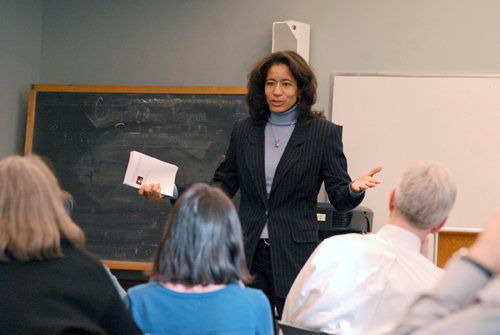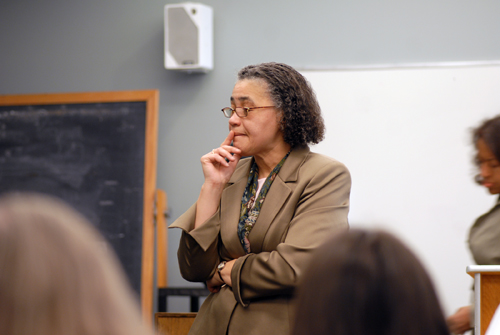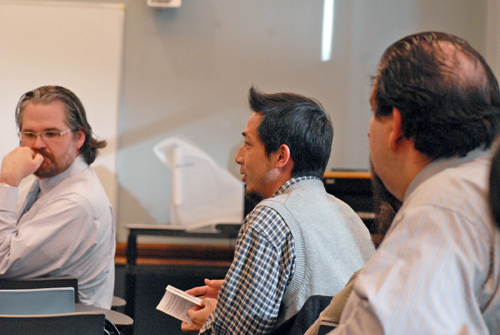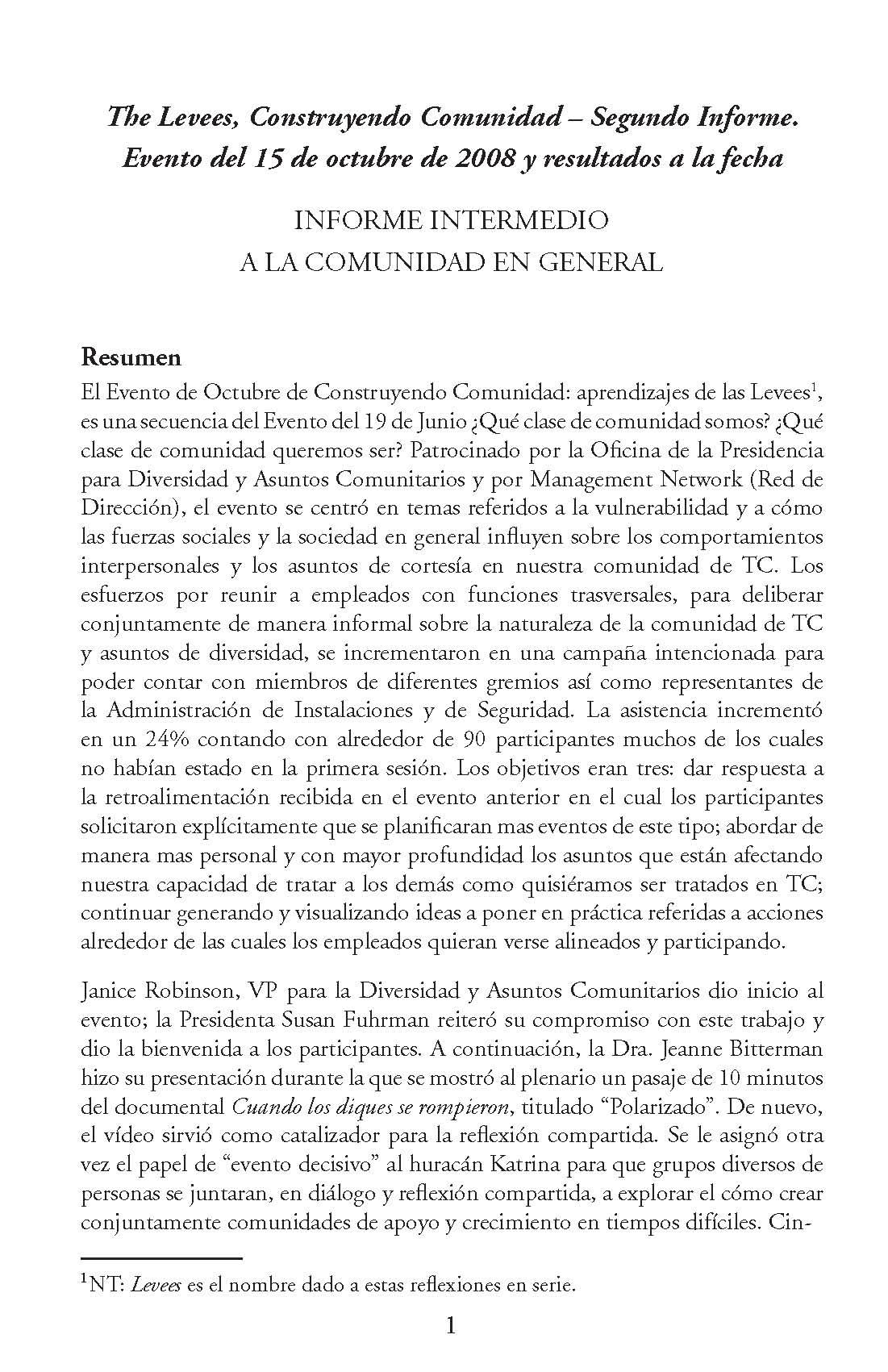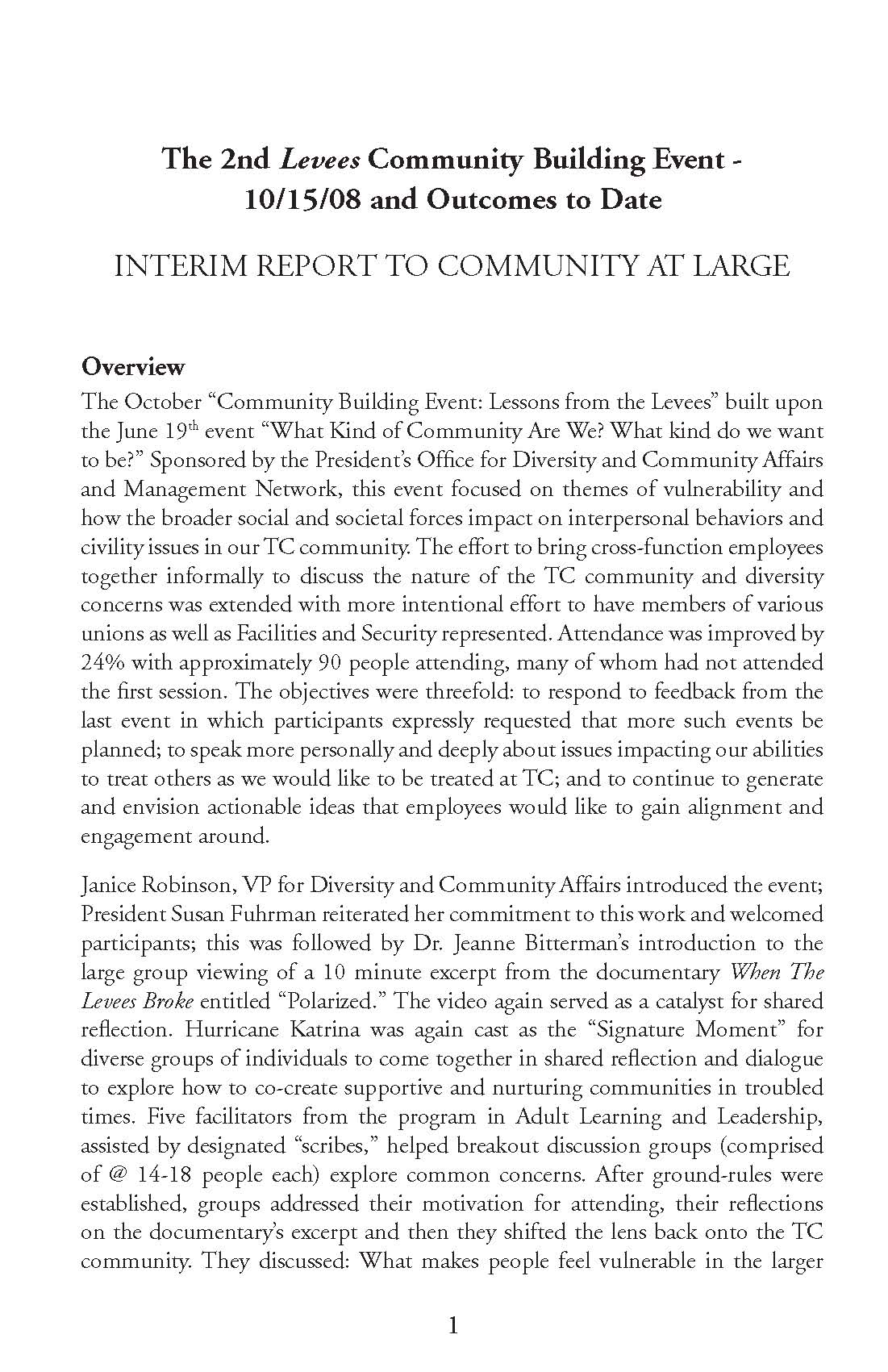Building a Better TC
Third Levees community-building event highlights flurry of employee suggestions and actions taken to strengthen pride in the College
For nearly a year, the Vice President’s Office of Diversity and Community Affairs, working with a committee from TC’s Management Network, has been spearheading an initiative to engage staff and faculty in conversations that will ultimately enhance a sense of community across the institution and lead to greater pride in the College.
On March 10, the Vice President’s Office for Diversity and Community Affairs and Management Network convened the third all-College meeting on community building to report back to the TC community on the various concerns and ideas put forth by staff and faculty, and to update concerned members on what actions have been taken based on that feedback.
“There have been many discussions and people making suggestions and now it’s time to reflect and think about where we want to go in the future in terms of the kind of community we want to be,” President Susan Fuhrman told the gathering of staff and faculty on March 10. “Participating in these events is in addition to all the work we do, but it helps us to understand what the greater good is and how we can all work to facilitate it.” President Fuhrman stressed that continued College-wide efforts on diversity and community building, even during difficult economic times, are essential.
The response has been positive yielding many suggestions addressing policies and procedures, as well as suggestions for such things as “meet-your-floor neighbors,” potlucks and employee mentoring. The feedback has come in large measure through two College-wide events tied to the “Teaching The Levees” curriculum created at TC by a team led by Margaret Crocco, Chair of TC’s Arts and Humanities Department, and based on Director Spike Lee’s documentary When the Levees Broke: A Requiem in Four Acts. The documentary chronicles the events of Hurricane Katrina and its aftermath, and the curriculum strives to engage viewers in re-committing to participatory democracy and examining the communities in which they live and work.
The two events, held in June and October 2008, drew a combined total of nearly 200 people. The Vice President’s Office for Diversity and Community Affairs and the Management Network subsequently sponsored a similar event for students on March 4, as well as a series of focus groups involving a range of constituencies, including those who have worked at TC for more than 10 years, union personnel, individuals with disabilities, employees who identify with LGBT concerns (lesbian, gay, bisexual or transgender), new employees, individuals of color, individuals belonging to majority cultures concerned with diversity issues, and those with religious identity concerns, to name just a few.
The themes that have emerged from all of those discussions—focused around the topic of “What kind of community do we want TC to be?”—are a set of common concerns and a range of suggestions for ways to strengthen the TC community.
Jeanne Bitterman, a lecturer in TC’s Adult Learning and Leadership Program who also co-authored the adult portion of the Levees curriculum, has helped guide the various community building and focus group conversations and on March 10 outlined some of the various concerns of TC personnel.
Some of the concerns, Bitterman said, include a perceived lack of civility across the institution, a need to improve communications and encourage greater dialogue of the sort the Levees initiative has engendered, and a desire to make available internal resources for the benefit of the TC community.
Bitterman, who wrote the initiative reports for both the June and October events, pointed out that many actions have already been taken. On the issue of civility, for example, employees suggested workshops on giving and getting feedback and on interpersonal communication. In response, the Vice President’s Office for Diversity and Community Affairs, in collaboration with TC’s Office of Human Resources and Cornell University ’s School of Industrial
In addition, faculty members Warner Burke and Debra Noumair from the Department of Organization and Leadership held workshops on “fear of reprisal and retribution” for members of the Management Network, and leaders of nonacademic departments.
In an effort to make TC resources available to the broader community, the College advertised the enrollment period for the Teaching English to Speakers of Other Languages’ (TESOL) Community English Program (in both English and Spanish) to union employees, and plans are in the works to make sure such services are routinely available to employees who need them.
As an outcome of the focus groups and the March 10 event, five voluntary Action/Implementation Committees were formed. They met through April and May and are making plans for the upcoming academic year. One of the committees has organized and planned the culminating Community Celebration/Cook-off and Nametag Day on June 18. This event offers another opportunity to be more inclusive, to get to know each other better and to celebrate community-building efforts.
Jolene Lane, Director for Diversity and Community Affairs, noted that several of the issues that have been raised at the focus groups have been addressed. In fact, the focus groups themselves grew out of the first Lessons from the Levees meeting in which employees expressed a desire for more opportunities for further dialogue and discussion. Lane noted that the first focus group involved union employees and as result of their concerns, the Vice President’s Office for Diversity and Community Affairs coordinated a series of informal conversations between the union employees and Harvey Spector, Vice President for Finance and Administration; in addition employees from the clerical union had the opportunity to discuss concerns with Provost Tom James.
Janice Robinson, Vice President for Diversity and Community Affairs, said the March 10 update meeting was an example of the College’s effort to enhance communication and transparency. She also said that the various discussions have yielded more than 19 specific suggestions. Some of the additional ideas included a visual directory of TC personnel by first and last name, creating employee affinity groups, and TC walking tours led by docents. The five implementation teams that have formed are made up of staff and faculty willing to make these ideas come to fruition.
“We don’t expect to do all 19 suggestions,” Robinson said at the March 10 meeting. “We all have busy lives, but we have done a lot of talking. So the goal now is to make some of this happen, and the way to do it is for people in the TC community to get together and decide what one, two or three items you might want to work on together and implement before the end of the academic year.”
Robinson also said that in response to requests to continue eliciting community-building suggestions and ideas, the College is installing suggestion boxes on the first floor of Zankel Hall, the Thorndike lobby, near the first-floor Horace Mann elevator and in the Grace Dodge Café. The suggestion boxes were created by TC maintenance workers Rocco Diomede and James Rudolf.
To view the 2008 Community Levees Workshop Report, visit www.tc.edu/news/6764.
Published Monday, Jun. 22, 2009
